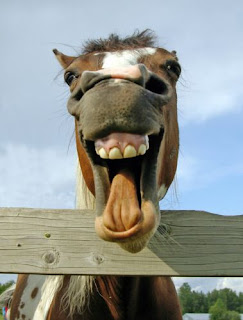We all know the problems of trying to be funny: skipping a key point of a joke; boring our audience; messing up the punchline; bad timing. Personally, I can't think of a more daunting endeavour than stand-up comedy.
I mean, really, there are as many different types of humor as there are personalities. Check out DailyWritingTips.com for a list of twenty of them.
And yet, the stand-up comic can employ not only words, but also the language of voice, face and body (not to mention stage tools that I know nothing about). And, of course, the live comic has the added benefit of instant feedback.
So what hope does the writer have of injecting humor into prose (yes, I've dropped the 'u' because my references don't include them)?
The opening quote is from Francis G. McGuire's chapter, 'Humor in Fiction' in How to Write an Uncommonly Good Novel, edited by Carol Hoover, Writers Mentor Group.
Instead of trying to emulate what McGuire says, here is a summary of his advice accompanied by some of his clever examples:
- Use free word association to come up with funny images and word combinations;
- Use inappropriate adjectives;
- Use alliteration and same sounding words;
- Use hyperbole;
- Repeat a single tag phrase, e.g. I used to date that girl;
- Twist familiar phrases, e.g. stark naked plus stark raving mad gives stark raving naked. Or, if Lord Stark marries Lady Raving, the servants must take care not to make Lady Stark-Raving mad;
- Twist grammar, e.g., Tomb Whom it May Concern may be the opening address for a letter advising a rent increase for cemetery occupants;
- Use archaic words, such as smote.
As usual, Writer's Digest has a number of excellent articles that talk about humor in writing. Leigh Anne Jasheway gives us a list of funny words, proposes generic tools, such as using comparisons, twisting clichés, and the rule of three, and provides interesting pointers for writers of any genre in her article on thinking like a comedy writer.
And how do we know if our attempts at literary wit are as hilarious as we think? Look for the wet patches, perhaps? In other words, I don't know, but I suspect that we should prepare ourselves to be a little embarrassed, just in case we mess up the punchline a few times before getting it right.
Exercise 63. Use some of the techniques suggested by McGuire or Jasheway to write a humorous piece about a real or imagined transitional stage of life, e.g., a new school, marriage, relocation.
Exercise 64. Think of ten clever or humorous twists of phrases, clichés or grammar. Think one-liners, bumper stickers, greeting cards, or use familiar objects as prompts.
During Week 33, I'm going to see what I have learnt or what I can find out, about Foreshadowing.

No comments:
Post a Comment